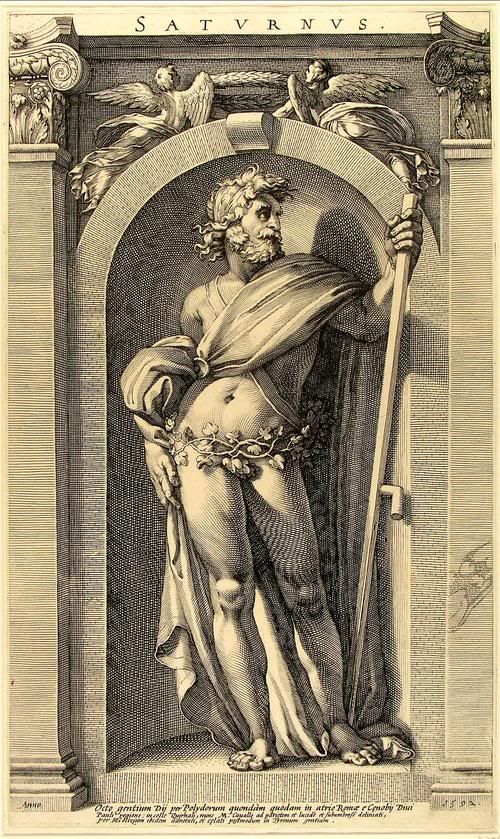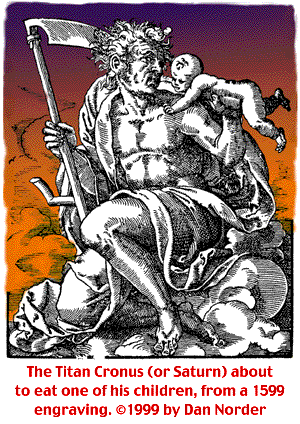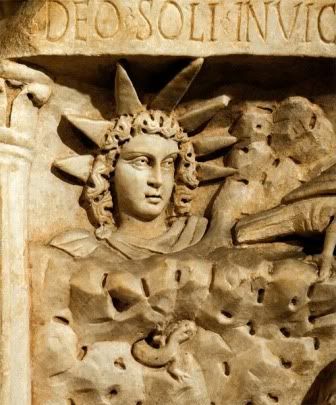The origins of the names of the days of the week:
Saturday
The word "Saturday" originates from the latin word "dies saturni"/"day of Saturn"It was named after the planet within the 2nd century by the Romans. The planet was named for the Roman god of agriculture. It has been called dies Saturni ("Saturn's Day"), through which has evolved into Old English as Saterdaeg and gradually evolved into the word "Saturday".

In Greek Mythology "Cronus" was worshiped as a harvest deity, overseeing crops such as grains, nature and agriculture. He was usually depicted with a sickle, which he used to harvest crops and which was also the weapon he used to castrate and depose Uranus. Cronus is associated with the Roman god Saturn.

http://s2.webstarts.com/lunarsabbath/origin_of_saturday.html
Sunday
Sun worship infects ancient Israel: In the ancient world, 'sun worship' was one of the most common forms of pagan idolatry. Immediately after Israel left Egypt, God warned His people against being "driven to worship the sun." Deuteronomy 4:19…..' And lest thou lift up thine eyes unto heaven, and when thou seest the sun, and the moon, and the stars, even all the host of heaven, shouldest be driven to worship them, and serve them, which the LORD thy God hath divided unto all nations under the whole heaven.' ….. Yet Israel later yielded to temptation, compromised with the nations around them, and dedicated their "horses ... to the sun." 2 Kings 23:11. During a time of revival, King Josiah purged much of Israel and "burned the chariots of the sun with fire." 2 Kings 23:11. Before the Babylonian captivity, many Israelite leaders rejected their Creator, yielded again to idolatry, and "worshipped the sun toward the east." Ezekiel 8:16……' And he brought me into the inner court of the LORD's house, and, behold, at the door of the temple of the LORD, between the porch and the altar, were about five and twenty men, with their backs toward the temple of the LORD, and their faces toward the east; and they worshipped the sun toward the east.' …… Sounds a lot like the 'sunrise service' many churches have at easter.The adoption of the 25th of December for the celebration of Christmas is perhaps the most explicit example of sun worship's influence on the Christian liturgical calendar. It is a known fact that the pagan feast of the Dies Natalis Solis Invicti - the birthday of the Invincible Sun, was held on that date.
One of the Roman names for this "Invincible Sun" god in the days of the apostles was Mithras. There are striking similarities between the ancient worship of Mithras and today's Christianity, leading some to think early Christians adopted Sunday worship from heathen customs.

Notice the below picture of the vatican. Take a look at the large wheel marked on the floor of St. Peters. This is a symbol of sun worship. If you do some searching, you will find countless sun worship symbols and images right throughout the Roman Catholic Church.

http://endrtimes.blogspot.com/2009/07/origin-of-sun-day.html
Monday
“Monday” is the day of the moon – from the Old English mōnandæg and mōndæg, both meaning “Moon Day”. This followed a long Indo-European notion of calling the day after the moon – in Latin, for example, the day is dies lunae, or “day of the moon”.http://www.webhistoryofengland.com/
In the 1950's a major temple to the Moon-god was excavated at Hazor in Palestine. Two idols of the moon god were found. Each was a stature of a man sitting upon a throne with a crescent moon carved on his chest (see Diagram 1). The accompanying inscriptions make it clear that these were idols of the Moon-god (see Diagram 2 and 3). Several smaller statues were also found which were identified by their inscriptions as the "daughters" of the Moon-god.

http://www.islamic-awareness.org/Quran/Sources/Allah/moongod.html
Thoth was also a moon god and the identification of the baboon with him eventually resulted in the baboon's association with the moon god, Khonsu. At the Temple of Khonsu in Thebes, statues of Khonsu in the form of a baboon fronted the complex. In the Late Period, we know from a baboon tomb at Saqqara that the god Thoth-Khonsu became an important nocturnal oracle god, to whom written petitions for the priests were submitted. In this form, during the Greek Period, he was called Metasythmis, meaning "hearing ear".

http://www.touregypt.net/featurestories/baboons.htm
Tuesday
English departs from Latin (and many other European languages) in naming this day of the week – in Latin, it was Martis dies, the day of Mars, a Roman god.In English, however, “Tuesday” is the day of the Saxon god Tiw, known in Norse languages as Tyr.
The Old English word was tiwesdæg , and we still celebrate this Saxon god of war and single combat weekly, on his day.
At one time, Tiw seems to have been more important in the collection of Norse and Saxon gods than Odin and Thor, but became less significant over time – effectively he was demoted and down-graded, by about 400 AD. In late Icelandic legend, he became the son of Odin.
There are places in England which are probably also named after Tiw, such as Tuesley and Dewsbury.

http://www.webhistoryofengland.com/
Wednesday
Wednesday is another Anglo-Saxon’s god’s day – this time, the day of Woden. In Latin, Wednesday was dies Mercurii, the god Mercury’s day, and that is reflected in Romance languages such as French.Woden, who replaced Tiw as head honcho in the god spectrum, is related to the Norse idea of Odin, but isn’t quite the same.
Woden was, like Odin, the god who carried away the dead, but he also lead the Wild Hunt (among many others who sometimes lead the Wild Hunt, a belief which continued for centuries after England became Christian). For more detailed information on the legends of the Wild Hunt, [url="see this article"]http://www.endicott-studio.com/rdrm/forhunt.html[/url].
As well as being a god, he was said to have been an ancient King. Anglo-Saxon Kings claimed descent from Woden, as part of their claim to power.
Woden-the-historic-King was supposed to have had four sons, each of whom founded one of the four main Anglo-Saxon Royal Houses – Kent, Wessex, Mercia, and East Anglia.
Woden’s name also survives in English place names, such as Wednesfield, Wensley, and Wednesbury.

http://www.webhistoryofengland.com/
Thursday
Thursday, the mighty red-haired lightening-bolt of the week.Oh, you better believe it.
Thursday is a fiery redhead.
See, it all started way back with red haired, red bearded Thor, Norse god of lightening and thunder.

The Old Germanic word for Thor (þórsdagr --> Þórr “Thor” + dagr “day”) is related to the word Jupiter in Latin. . In Latin, Jupiter - head of the pantheon - is Iovis, but I and J are the same in Latin (much as the latin IESVS --> Jesus - there is no J in Latin per se, but in English I gets translated as a J) Iovis becomes ---> Jovis --> Jove, which is why in the Romance languages we have Thursday translated as: Italian Giovedi, Spanish Jueves, French Jeudi, Catalan Dijous, and Romanian Joi.

Jupiter
Brief aside* Also, in many Indian languages the word for Thursday is Guruvar, from the Sanskrit Guru, the name for the planet Jupiter. While we're in the neighborhood of Sanskrit, and southeast asia in general, note that in Thailand the color associated with Thursday is orange.
There is some contention as to how tenuous the connection between Iovis/Jove and the ineffable name of God in the Torah, YHVH or YHWH, translated variously from the Hebrew as Yahweh or Jahweh.
Back to Sanskrit, the word Jivah (our contentious resemblance to Jehova, Jove and Jahweh) is translated variously in the Vedas as living being, lord of living beings, soul, chief of living beings, etc. It is also worth noting, while we're talking about Sanskrit, that dyo is the word for heaven and div is the word for to shine and is related to diva, an adverb meaning during the day. Those words sneaked into Latin and serve as roots for words like divine and divinity et al. We also have divasa (masculine) and dyu (neut.) - a contraction of div - both of which signify heaven and day. As dyu was transmitted to Latin, the d was dropped and it became Iu/Ju, as in Ju-pater, where pater = father (sanskrit = piter), and is the root for words like paternal, etc.
There is also a transmission from the Indu god Dyaus Piter (the heavenly father) from the - Rg Veda - who along with the goddess Prthivi (the earth mother, female aspect of creation and the goddess of vegetation) - were responsible for siring the entire Vedic pantheon, the placement of heaven and Earth, and preserving the cosmic order of things.
Will it surprise you if I say Dyaus makes the transition into Greek as as Zeus, the god of the sky, master of celestial fire, father of the gods and giver of laws and married to Hera, Greek goddess of fertility?

Zeus
Back to Jupiter (called dies pater -shining father), Roman god of sky, light, and father of the Roman pantheon, responsible for the order and laws of the universe, who gave man night and day and causes storm clouds to gather - married to Juno - queen of heaven, goddess of women, fertility. She is also the goddess of marriage. Ever wonder what the most popular month for getting married is? June.
Back to Jupiter, the fifth planet in the solar system.
Back to Thor, god of thunder, issuing lightening as he rides his chariot across stormy skies, married to Sif, Norse goddess of fertility.
Back to Thursday, fifth day of the week.
http://physicalchallenge.blogspot.com/2008_09_01_archive.html
Friday
Friday is named after yet another Anglo-Saxon god, or in this case, goddess, Frige. She is also known in other Germanic languages as Frigg, or Frija.She was the goddess of love, and appears to combine two different romantic and love goddesses from Norse and Scandinavian gods, Freyja and Frigg.
In Roman Latin, Friday, dies Veneris, was the day of the planet Venus, and once again, languages such as French have followed this root.






1 comment:
You have provided a fantastic website.
My website :: Furniture Designers Brisbane
Post a Comment